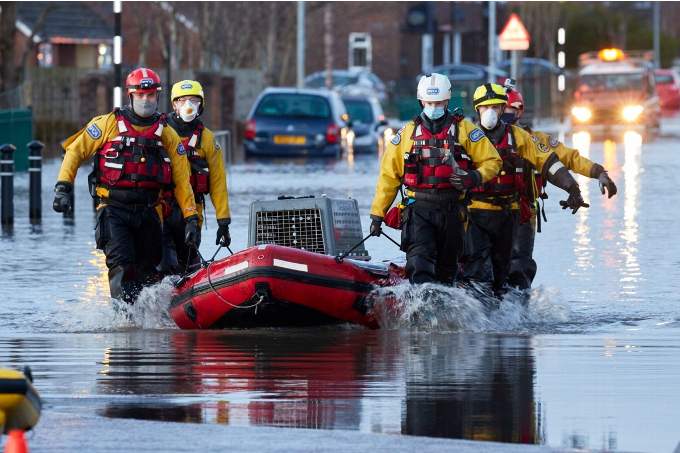THE RSPCA is issuing advice to animal-owners in the event of flooding and strong winds resulting from Storm Eunice hitting Cornwall and the rest of the South West this morning, and in the wake of the strong winds and heavy rainfall from Storm Dudley on Wednesday.
The Met Office has issued a red weather warning in the South West and South Wales for much of today (Friday) as forecasters predict strong winds, particularly in North Cornwall, North Devon and West Somerset, of up to 90mph.
An amber alert is also in place across the rest of southern England, East Anglia, the Midlands and Wales, while a yellow weather warning for snow and wind is in place for the North of England and parts of Scotland.
RSPCA spokesperson Amy Ockelford said: “Storm Dudley hit parts of the UK hard earlier this week and now forecasters are predicting that Storm Eunice could be even stronger. We’re urging pet owners to keep an eye on the forecast where they live and to plan ahead to ensure the safety of their animals.”
A number of flood warnings and flood alerts are in force across the UK so pet owners have been advised to make a plan.
Amy added: “Be sure you have a plan so you know how to get your family, and your animals, out of danger should flooding affect you. Floodwater can rise rapidly so we would urge people to act early and never to put themselves at risk to help an animal but to call our emergency rescuers on 0300 1234 999 for help.”
Tips to keep pets safe during stormy weather
• Ensure you have a supply of food and medication for your pets;
• Ensure cats have access to the house or a warm, inside area where they can stay dry and escape the weather - if the weather becomes extreme, you could keep cats inside;
• Plan dog walks around the worst of the weather, and avoid any dangerous locations;
• If your dog is elderly, sick or feels the cold, get them a special coat to keep them warm;
• Wear reflective clothing if it’s getting dark of visibility is poor,
• Provide pets with a quiet, safe space to retreat to if they find the wind or storms frightening;
• Provide outdoor pets, like rabbits, with lots of extra bedding and ensure poultry, like chickens and ducks, have safe, dry shelter;
• Move outdoor pets inside or into a suitable outbuilding if the weather becomes extreme;
• Make a flood escape plan and ensure you have suitable carriers for small animals as well as collars, leads and carriers for cats and dogs should you need to evacuate;
• Rug horses and ponies and ensure they have adequate shelter or move them into stables if the weather is extreme;
• Make arrangements with a reliable, experienced friend to care for your horse or livestock in case you can’t reach them due to fallen trees or flooding;
• Consider leaving your contact details on field gates in case of emergency;
• Wild animals can struggle to find food and water during extreme weather, or may get lost or blown off course - leave out food and water for wildlife and seek help if you find an injured or stranded animal.
The RSPCA is part of Defra’s National Flood Response Team and has about 100 officers trained and equipped to deal with flood-stricken animals, as well as a fleet of 35 inflatable boats.
The team can be placed on standby to respond to flooding emergencies, rescue animals and people, and support multi-agency flood evacuations.
If your area floods you should consider moving your animals to higher ground (if outside) or moving pets inside - preferably upstairs. If you have to leave pets behind, ensure they have plenty of food and water, leave notices on outside doors making it clear that there are animals inside who need help and contact your local flood warden immediately.
Never put your own life in danger to attempt an animal rescue. If you’re concerned about an animal in stormy weather or flooding please take a note of the location and time, and call the RSPCA on 0300 1234 999 for advice.
To help the RSPCA continue rescuing, rehabilitating and rehoming animals in desperate need of care please visit our website or call the RSPCA donation line on 0300 123 8181.



.png?width=209&height=140&crop=209:145,smart&quality=75)
